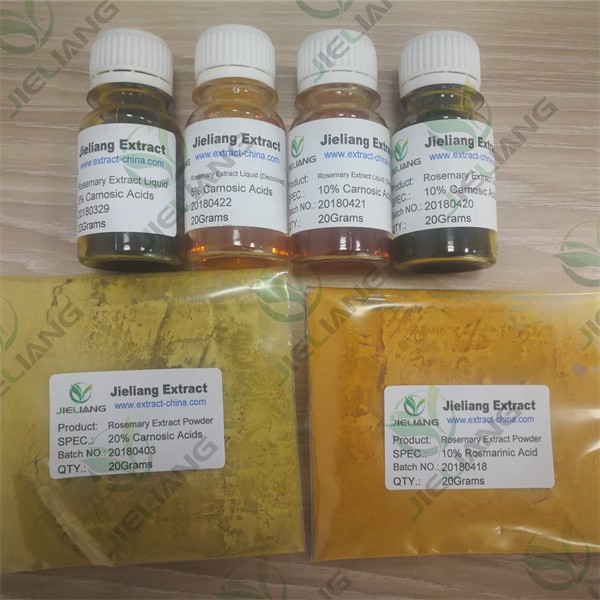Synonyms:
Rosmarinus Officinalis Extract
Salvia Rosmarinus Extract
Rosemary Leaf Extract
Appearance:
Greenish Yellow Fine Powder to Light Yellow Fine Powder
Dark Brown Oil to Light Yellow Oil.
Active ingredients:
Rosmarinic acid, Carnosic acid, Ursolic Acid, Carnosol
Specification:
1) Rosmarinic acid powder 2.5%, 5%, 10%, 20%, 30% by HPLC
2) Carnosic acid, Oil or Powder
5%-10% Carnosic acid by HPLC in oil
5%-99% Carnosic acid by HPLC in powder
3) 25%, 50%, 90%, 98% Ursolic Acid by HPLC
4) Rosemary Oil (distilled or supercritical CO2 fluid extraction )
Jieliang is a Chinese manufacturer for rosemary leaf extract. Rosemary is a fragrant evergreen herb native to the Mediterranean. It is used as a culinary condiment, to make bodily perfumes, and for its potential health benefits.

The Rosemary is a kind of precious natural perfume plant “Rosemrinus officinalis”, a fresh smell exhale from the plant in the whole growing season. The Rosemary is all-purpose economic crop, which is a good source to extract antioxidants, rosemary oil and pharmaceutical intermediates.
The antioxidants from rosemary are phenol acid and flavonoids. The recognized and effective autoxidation from Rosemary is Carnosic acid, Carnosol, Rosmarinic Acid, Ursolic Acid, Rosmanol. The rosemary oil consists of more than 30 kinds volatile components.
Carnosic acid (CAS No.:3650-09-7, C20H28O4)is a natural benzenediol abietane diterpene found in rosemary (Rosmarinus officinalis) and common sage (Salvia officinalis). Dried leaves of rosemary and sage contain 1.5 to 2.5% carnosic acid.
Carnosic acid and carnosol, a derivative of the acid, are used as antioxidant preservatives in food and nonfood products, where they're labelled as "extracts of rosemary"



Rosmarinic Acid ( CAS No.: 20283-92-5, C18H16O8) named after rosemary (Rosmarinus officinaliss Linn.), is a polyphenol constituent of many culinary herbs, including rosemary (Rosmarinus officinalis L.). When extracted from plant sources or synthesized in manufacturing, rosmarinic acid may be used in foods or beverages as a flavoring, in cosmetics, or as a dietary supplement.
Ursolic Acid (CAS No.: 77-52-1, C30H48O3) Ursolic acid (sometimes referred to as urson, prunol, malol, or 3β-hydroxyurs-12-en-28-oic acid), is a pentacyclic triterpenoid widely found in the peels of fruits, as well as in herbs and spices like rosemary and thyme.
Application
1) The antioxidant ability superior to VE, TP, anti-bacteria, lower blood lipids, prevent hypertension and atherosclerosis etc.
Carnosic acid: We do supercritical fluid extraction of Carnosic acid; it is safe and applicable in edible oil, food supplements, meat products, food, cosmetics, pet food, etc.
Rosmarinic Acid: It is spray dried powder, 100% water soluble, it is usually applicable in aquatic products, oral liquid, beverages, cosmetics, food supplement, food, meat products, etc.
Carnosol: It is applicable in edible oils, food supplements, meat products, food, cosmetics, pet food, etc.
2) A natural feed additive- Rosemary Extract
The all antioxidants in rosemary extract, especially the Rosmarinic Acid, which has a general anti-inflammatory effect and that they protect tissues and thereby the overall health of the digestive tract. The natural rosemary extract is a good alternative of Vitamin E in feed.
COA and Chromatogram For Reference




















